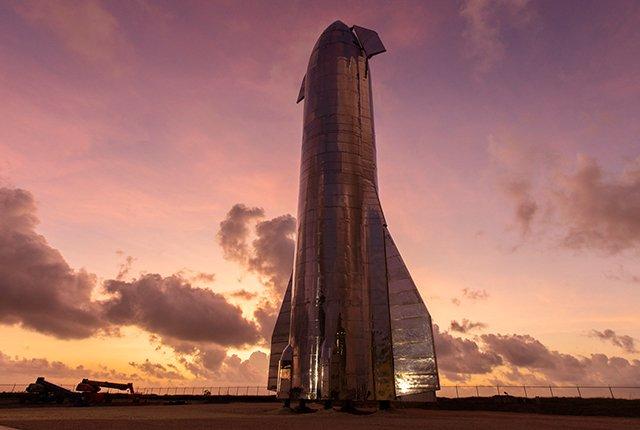
SpaceX appears to be preparing to launch its Starship spacecraft on a major flight test in the coming weeks.
On Saturday, the company’s CEO Elon Musk tweeted the next prototype of the Starship spacecraft will be completed in about a week (19 September).
Dubbed SN8, its build will include flaps and a nosecone, as opposed to the simulated weight placed on top of the previous prototypes.
Following its completion, Musk said the SN8 will undergo static fire tests and ground checkouts before being launched to an altitude of 60,000 feet (18.3km).
This is around double the cruising altitude of commercial passenger aircraft.
Once it has reached this altitude, it will descend back to Earth before being brought down in a controlled landing.
It’s not yet clear if this test will include SpaceX’s plans to drop the Starship in a horizontal position, before using what is being labeled as a “bellyflop” manoeuvre to reorient the spacecraft for a vertical landing.
YouTube user C-bass Productions created a rendered video of what the test could look like with the manoeuvre.
Starship plans
Following SpaceX’s first successful crewed mission with astronauts aboard the Crew Dragon 2 spacecraft, Musk sent an email to employees stating the development of Starship will be their primary focus.
The company is building Starship as a fully reusable spacecraft for Earth orbit missions and future trips to Mars.
While its current Dragon 2 capsule and Falcon 9 rockets are also reusable, Starship will be capable of carrying a much larger number of people and a heavier payload.
Whereas the Dragon 2 capsule has space for seven astronauts, SpaceX is aiming for a 100-person capacity on the Starship.
In terms of payload, the Falcon 9 rocket can currently carry 60 Starlink satellites at a time, while Starship will have enough room and power to hold 400 satellites.
Test hops
As part of Starship’s development, SpaceX recently completed two successful test hops with its SN5 and SN6 prototypes at the SpaceX South Texas Launch Site in Boca Chica.
These tests involved a launch and controlled climb to an altitude of 500 foot (150 metres) before descent and landing.
The video below shows the flight test of the SN5 Starship prototype.


